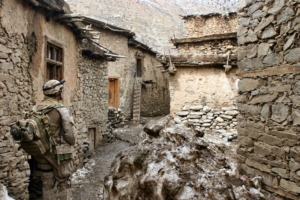
While the world is living through the most tense nuclear face-off since the 1962 Cuban missile crisis, the United States is mostly watching the Kardashians. Yes, it’s true, some countries close to Ukraine are stocking up on iodine pills to combat the possible impact of nuclear radiation; but the post-Truth (nothing is really happening) American worldview is starting to minimize this conflict. Does the Ukraine-Russia war matter to the United States or not?
Democracy is in retreat: We tend to think that democracy is not only the best form of government, but the most stable. To paraphrase Churchill: Democracy sucks hard, but it’s better than the alternatives. The 1990’s and the early 2000’s were a triumph for democratic governments. After the collapse of the Soviet Union, political freedom and fair elections were at an all-time high–including in places like Africa and Latin America that had struggled to have democratic systems. But all of that began to change in 2006, and we now have seen 16 straight years of democratic decline around the world. Ukraine was one of those former Soviet-Republics that ushered in a messy, corrupt, chaotic democracy, but nevertheless began to turn the tide and brought increasing levels of transparency and accountability. But just as they did that, Russia’s oligarchic kleptocracy decided to destroy the whole country, using sham elections as one of many anti-democratic tools. The world can’t afford to not only see democratic decline, but also stand-by while predatory autocratic states actively seek to destroy any country that is genuinely trying to have a government that is accountable to the people.
Stopping Russia’s Playbook of Chaos: Americans don’t seem to realize that weaponizing social media, employing troll farms to make fake accounts, outright buying political parties, and creating social divisions is a playbook Russia has used since the 1920’s. Of course, there was no internet or social media back then, but all of that has only made it easier, faster, and cheaper to do nowadays. It’s no accident that Fascist, nationalistic, anti-democratic parties have flourished in Italy, France, Austria, Spain, the UK, Poland, Greece, and Hungary, as well as the United States all at the same time. This is the Russian playbook of chaos. Find wedge issues in a particular country you wan to defeat, support a political party that has the most internally divisive platform, and cause a civil war within the democratic country instead of trying to figh them head on militarily or economically. This is what Brexit was about, this is what Hungary’s rebelliousness toward the E.U. is about, this is why Poland took a suprising hard-right turn prior to the Ukraine invasion, and this is why Americans no longer believe in election results. By the way, China does this as well. This tactic is extremely inexpensive compared to trying to compete militarily with the United States and NATO. The best part for Russia sis that all of a democracy’s tension, anger and rage gets channeled toward their own citizens and political parties instead of toward Russia or China. It’s no coincidence that suddenly we are seeing a wave of “Russia is okay, why don’t we stay out of it” narratives in the United States. Eight years into this form of social media attack, and Americans, Brazilians, Brits, Italians and everyone else is still falling for this cheap, inexpensive trick.
China is Watching: While the world was sleeping, China totally eradicated democracy in Hong Kong, ushered in a cult of personality leader, and Russia invaded Georgia, Ukraine, interfered in Syria and waged a social media war against multiple nations. The reaction was to give both Russia and China Olympic games to host, and a World Cup to Russia. Both Obama and Trump are guilty of empowering Russia and China. Trump’s standing up to China was based on his zero-sum understanding of economics, not on issues of democracy, human rights, and authoritarianism. Obama never punished Russia significantly even though the Ukraine invasion and democratic subversion began on his watch. China, which is significantly weaker militarily than the United States, but much stronger than Russia was watching this the whole time. Like Ukraine, Hong Kong was a vital contributor to the world’s economic prosperity that was easily swallowed up while the world looked on. The immediate, mobilized response of NATO to Putin’s latest invation was a shock to Putin and China. China is now watching to see if the world’s pro-Democracy nations can be weakened if you just wait them out. While NATO’s strong actions toward Russia initially made China nervous about taking Taiwan (a model democracy), they will feel emboldened if the NATO alliance against Russia falls apart.
Food and Energy: Food and energy shortages and high prices will be the big story of the 2020’s. It may take a year for people to realize how serious these two issues are, but when it hits, it will hit hard. The world’s prosperous countries cannot sit by and tolerate a nation like Russia keeping food and energy hostage. Since the Russians don’t produce anything and even rely on Western technology and firms to extract their oil and natural resources, they don’t have a long-term winning strategy. But it’s vital that the rest of the world move quickly to end the blackmail. Russia is a kleptocratic regime filled with many people beyond Putin who want Russia’s natural resources on the market. Putin’s blackmail hurts the world and the Russian economy. It’s called cutting off your nose, to spite your face or, shooting yourself in the foot just to make your enemy mad. The quicker the world restores Ukraine’s food and energy production and protects it from Russian sabotage, the easier it will be to do this in other strategic areas.
The Nuclear Fear: One agrument against getting involved is Putin’s threat to use nuclear weapons. But, ironically, it is much more difficult to green-light the launching of a nuclear weapon in the Russian system than in the US system. Maybe it’s not ironic since the Russian mind and its thousand year history has a great fear of war, while the United States and its short 200 year history thinks violence solves everything. The Russian military is now at odds with the FSB, and we’ve learned that money meant to keep up Russia’s defense was and is all siphoned off to cronies. Furthermore, the United States has the technology to identify a nuclear launch being set up and stop it before it blasts off (they just don’t advertise this). As long as Putin is alive, the nuclear threat is always on the table. There’s no record of Putin actually ever showing any real bravery in combat or as a KGB agent. His former speechwriter says that deep down he is a coward who lets others do the dirty work. In my opinion, Biden should have sent special teams in to secure all of the nuclear reactors as soon as we saw the Russians targeting Zaporizhzha and Chernobyl. By not doing anything, more nuclear sites and threats have been made.
History Rhymes: “History doesn’t repeat, but it does rhyme,” as Mark Twain said. From a historical perspective, anytime you see geo-political shifts that include the breakdown of global trade, fragmenting and shifting alliances, economic turmoil, nationalistic and xenophic parties, and aggressive despotic behavior from leaders of military powers–it’s not time to “sit this one out.” These are the monumental shifts that occurred in the lead up to World War I and World War II. The United States–a bit player at the time–thought it could sit that one out. But the world was too interconnected for that. The United States seized the moment after World War II and set up the free-market era that led to the American Cenutry. Nature abhors a vaccum, and a lack of American and Western participation will lead to a dangerous vacuum that China, Russia, North Korea, Turkey, and other hostile nations will fill. The option to not engage is not an option. Either the United States remains engaged now with the capacity to add-value to the light of democracy, or it withdraws and sees its fortune fall along with other nations.
